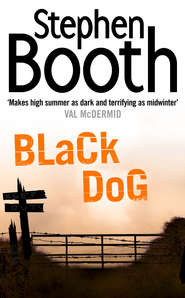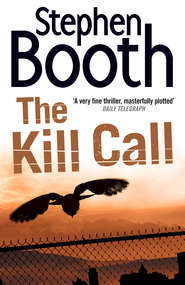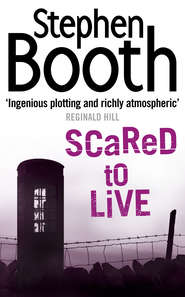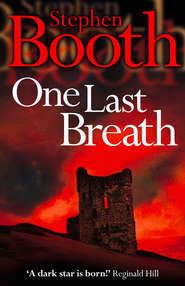По всем вопросам обращайтесь на: info@litportal.ru
(©) 2003-2024.
✖
Blind to the Bones
Автор
Год написания книги
2019
Настройки чтения
Размер шрифта
Высота строк
Поля
By the time Kessen arrived at the scene by the air shaft, the forensic medical examiner had already attended, and the machinery for an enquiry into a suspicious death was starting to get into action. PC Knott was being kept occupied controlling access and recording the names of everyone who arrived in the scene log.
‘The victim is male, appears to be in his early twenties, and has suffered serious head injuries,’ said DI Paul Hitchens, as DCI Kessen struggled up the last few yards of the slope.
The track below was already filling up with police vehicles. Their white and orange looked ludicrously out of place in the dark, bare expanses of peat moor.
Kessen simply nodded, and took up a position from where he could see the body without entering the taped-off area. He was wearing a heavy overcoat that made him look twice his normal size and hid his real shape. He had a habit of keeping his lips pushed together, and he rarely smiled. When he did, he revealed crooked teeth that would have benefited from an orthodontist.
‘The doctor thinks that death occurred over twenty-four hours ago, from the condition of the body. The attendance of the pathologist has been requested, I understand?’
Kessen nodded again. He found a packet of mints in the pocket of his coat and put one in his mouth. He didn’t offer Hitchens one.
‘The SOCOs are here. At least they can start getting their photographs and videos before the pathologist arrives. If we get Mrs Van Doon, things should move quickly. The body was discovered by a couple of firefighters from Glossop. Luckily, they had the sense not to mess around too much with the scene.’
The DCI didn’t reply. His mouth moved as he sucked his mint. His eyes were fixed on the area marked off by tape, where the scenes of crime officers were clustering.
‘The Crime Scene Manager has established an approach path, and the major incident vehicle is on the way,’ said Hitchens. ‘And the really good news is that we’ve found an unattended car, parked in a lay-by just below here on the A628. It’s an old Volkswagen Beetle. If it turns out to belong to the victim, we could be in luck. This could be a forty-eight-hour job.’
Kessen coughed. Hitchens looked at him as if he thought he might actually be going to say something. But he wiped his mouth with a handkerchief from his pocket, and began to chew his mint again.
‘I assume you want to assess the body with the pathologist?’ said Hitchens. ‘Or would you rather I briefed you later? Perhaps you have other things to do?’
‘I want full forensic exploitation of the scene,’ said Kessen, without looking at him. ‘Tell them to extend the tape three yards up the hill, and two yards beyond the scene on the other side. There’s a disturbed area of bracken to the east of here that must be preserved. I want soil samples taken from three sites I’ll mark on the map. And get all these vehicles moved back down the track fifty yards. Nobody comes beyond that point, except the pathologist and the SOCOs. And for God’s sake, keep that person with the video camera away from whatever this stone structure is. He’s leaving his traces all over the bloody thing.’
‘It’s a ventilation shaft,’ said Hitchens.
‘I’ll be in my car. Let me know when the pathologist is ready for me.’
‘Yes, sir.’
‘Would you like a mint, Inspector?’
Hitchens took a mint from the packet he was offered, and stood with it in his fingers as he watched DCI Kessen walk back down the track to his car. Then he turned to look for the Crime Scene Manager.
The smell of a dead body was unmistakable. Ripe, sweet and intimate. Ben Cooper could detect it hanging around in the vicinity of the air shaft as soon as he arrived. It was as if an obscene tropical plant had suddenly flowered in the middle of the peat moor, spreading its noxious scent for hundreds of yards downwind.
By the time Cooper had made his way past the cluster of police vehicles, a small group of white-suited and masked figures was already moving forward beyond the tape to approach the body. Though they were difficult to identify, one would be the pathologist, Juliana Van Doon, and the others the Crime Scene Manager and the Senior Investigating Officer. He thought the stiff, stocky figure whose suit didn’t fit properly was probably DCI Oliver Kessen, who was therefore presumably SIO. Their approach was being recorded on video by a scenes of crime officer.
Cooper joined the officers he could see standing back from the scene. DI Hitchens was talking on his mobile phone, maybe trying to round up more specialized help for a search, or the attendance of a forensic scientist. There was also a detective sergeant he knew, but no sign of Diane Fry.
Though the day was mild and a breeze blew across the moor, a trickle of steam was drifting from the mouth of the air shaft, as if it were a kettle that had recently finished boiling.
A hundred yards into the heather, a pair of lapwing lifted and began to circle at a distance. A curlew was calling, but it was impossible to locate it against the landscape. Its bubbling song rolled around the slopes of the surrounding hills like running water.
The air shaft itself was at least twelve feet high, and about eighteen feet across, much too high to get a look inside without a ladder. It had been rebuilt at some time – and the builders had used any piece of stone that came to hand. Some were the original dressed chunks of sandstone, blackened by soot from the steam trains that had passed below ground. But in between there were smaller pieces of clean stone, their golds and reds mortared together with the black in a rough patchwork. From a distance, the result gave the air shaft a look of being in camouflage. It blended in well against the hillside behind it. It looked solid enough, but on the windward side the mortar was already beginning to crumble. No trained waller had rebuilt this.
It was one of those spells when there was nothing to do but wait. Cooper walked a little way across the peat from the air shaft. A snipe took off from almost under his feet, where it had been nesting invisibly in a boggy patch, hoping no one would notice it.
All around him, he could see the wet, black mounds of the moors, broken by small valleys. In some of these places, the peat had been eroded right to the bedrock, worn down to the bone.
Cooper tried to orientate himself to figure out which valley had Withens somewhere at the bottom. He located it by the trees and a glimpse of a road disappearing over a rise. He thought this air shaft was the one he had been able to see from the roadside above Withens.
He could see patterns burned into the heather moors below the road. They were so precise that they looked almost like giant letters, with exact verticals and horizontals linked neatly together. In fact, the series of shapes could have been a message designed to be read only by aliens in outer space. Cooper hoped the aliens had good dictionaries – the message seemed to consist entirely of ‘H’s.
In the midst of the high, empty spaces, the skyline was broken by a line of lorries heading towards Manchester on the A628. Somewhere up there were the remains of one of the ancient guide marks for the old packhorse roads. They were the only remaining signs of the trade that had once passed across these moors before the turnpike roads and railways had arrived. Medieval salters and badgers had relied on those stone markers to guide them across featureless terrain in all kinds of weather. The Dark Peak moors had created an almost impassable barrier. Even now, there was only the one road through Longdendale.
Activity behind him made him turn and join the group of officers. A quick search of the area around the body and the victim’s clothing had produced a wallet, with identification. The information was passed back from the area cordoned off at the air shaft.
‘Name of Neil Granger, with an address in Tintwistle,’ said DI Hitchens.
‘That’s only a few miles down Longdendale from here, sir.’
‘Good. Let’s hope we can keep it local.’
After a few minutes, DCI Kessen made his way carefully away from the body via the approach path that had been marked out. The protective suit did him no favours – his paunch protruded like a round cushion. Kessen stood a few feet away and waited patiently until he had everyone’s attention.
‘We have an ID, as you know,’ he said. ‘There are cash and credit cards in the victim’s wallet, so it seems we’re looking for a motive other than robbery. And down in a lay-by on the main road, we have a vehicle whose registered owner matches the ID from the victim.’
The DCI spoke in a flat, matter-of-fact tone that made him sound almost as if he were bored. But Cooper decided he quite liked it. It had an air of calmness and confidence that was sometimes lacking at the start of a major enquiry.
‘It’s an open scene, of course, but the perpetrator must have left some traces on his approach or departure, so I intend to fully exploit all forensic opportunities. And if the victim came up here voluntarily, then he came for a reason – and possibly in the company of his attacker. A check on the victim’s associates and his recent movements will produce some early lines of enquiry, I’m sure. Where’s the nearest civilization – anyone know?’
‘A village called Withens, sir,’ said Cooper. ‘Down in the valley to the east.’
‘Know it, do you?’
Kessen’s gaze was steady, almost impersonal. Cooper wondered whether the DCI had forgotten his name.
‘Yes, sir. I’m seconded to the Rural Crime Team for some enquiries down there, and I’m in the middle of conducting interviews. In fact, if this is the same Neil Granger, he’s related to several of the residents of Withens, and the vicar was expecting to see him yesterday.’
‘Ah. Keep on it, then. There’s a local connection here, I’m sure of it. And while you’re in Withens, you can have a word with this Michael Dearden, who the FOAs had to turn back from the scene in his car. In fact, perhaps you can do that first, in case there’s anything of interest. Find out what he was doing up that track in his four-wheel drive when there’s a perfectly good road. We looked at the maps, and he must have driven up past a disused quarry called Far Clough.’
‘I’ll find it.’
DI Hitchens rubbed his hands. ‘Yes, it could be fairly straightforward, sir,’ he said. ‘That was my own feeling from the start.’
Kessen looked at him, and said nothing. Behind the DCI, Neil Granger’s body was being turned over for the video cameras. And everyone could see that the victim’s face was covered in black make-up, streaked by the blood from his wounds.
11 (#ulink_7f1995ea-8efb-5581-9fc4-bc22a1bc6c3a)
In Withens, a few elderly people were arriving at the church as Ben Cooper drove past. Perhaps the vicar held an afternoon service for them. Cooper looked for the Reverend Alton in the churchyard, but couldn’t see him.
At Waterloo Terrace, some children watched him pass. Their bikes lay on the ground in a tangle, the spokes of their wheels lying on top of each other in complex patterns. There were two boys around the age of fifteen, one with short-cropped hair and the other with gelled spikes. There was a girl of about the same age, and a smaller boy who couldn’t be more than ten, who leered aggressively at the car. Behind them, Cooper glimpsed a taller figure, a well-built young man in his twenties. Could that be Scott Oxley, the eldest son?
Cooper barely had time to think about it before he found himself driving out of the village to the east, where he passed an old man standing in the road. In fact, he had to slow right down to avoid running him over. The man was wearing a tight tweed jacket and a pair of baggy trousers that had been made for a younger, bulkier man – a man who had worn them until the seat shone and the edges of the pockets were frayed like lace.
Cooper wound down the window of the Toyota.
‘I’m looking for Shepley Head Lodge,’ he said. ‘Am I on the right road?’











